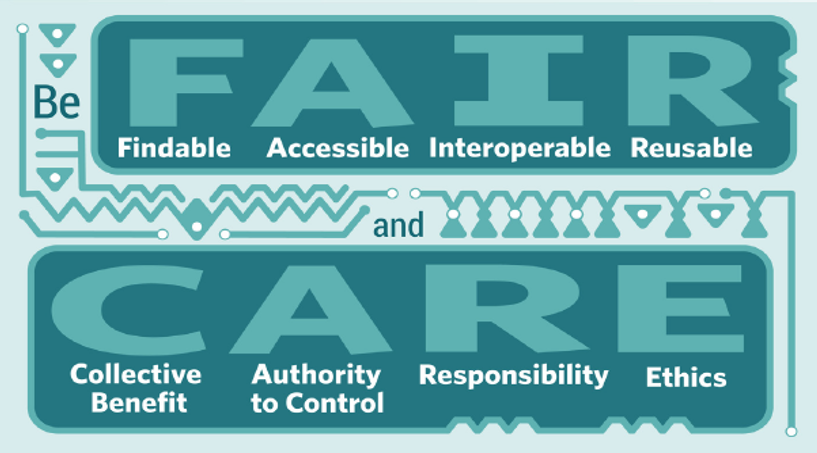Indigenous Data Governance
The Indigenous Data Commons will leverage Indigenous Data Network and ARDC capabilities and research in creating programmatic applications for CARE and FAIR scoring of metadata records.
Outcomes include supporting institutions to manage and share data more freely and cooperatively following the principles of:
- CARE (Collective benefit, Authority to control, Responsibility and Ethics)
- FAIR (Findable, Accessible, Interoperable and Reusable)
- Closing the Gap Priority Reform 4
CARE Principles
 Image credit: GIDA
Image credit: GIDA
The CARE principles, developed by the Global Indigenous Data Alliance (GIDA), reflect the crucial role of data in advancing Indigenous innovation and self-determination. They ensure that data movements like the open data movement, whatever they're advocating and pursuing, respect the people and purpose behind the data.
Collective Benefit
Data ecosystems shall be designed and function in ways that enable Indigenous Peoples to derive benefit from the data.
- C.1 For inclusive development and innovation
- C.2 For improved government and citizen engagement
- C.3 For equitable outcomes
Authority to Control
Indigenous Peoples' rights and interests in Indigenous data must be recognised and their authority to control such data be empowered.
- A.1 Recognizing rights and interests
- A.2 Data for governance
- A.3 Governance of data
Responsibility
Those working with Indigenous data have a responsibility to share how those data are used to support Indigenous Peoples' self-determination and collective benefit.
- R.1 For positive relationships
- R.2 For expanding capability and capacity
- R.3 For Indigenous languages and worldviews.
Ethics
Indigenous Peoples' rights and wellbeing should be the primary concern at all stages of the data life cycle and across the data ecosystem.
- E.1 For minimising harm and maximising benefit
- E.2 For justice
- E.3 For future use.
FAIR
In 2016, the 'FAIR Guiding Principles for scientific data management and stewardship' were published in the open-access journal, Scientific Data. The authors intended to provide guidelines to improve the Findability, Accessibility, Interoperability, and Reuse of digital assets.
The principles are set out in full on the GO FAIR website. ARDC also offers comprehensive information and training. The FAIR Principles refer to three types of entities: data, metadata and infrastructure.
Findable
Metadata and data should be easy to find for both humans and computers.
- F.1 (Meta)data are assigned a globally unique and persistent identifier
- F.2 Data are described with rich metadata (defined by R1 below)
- F.3 Metadata clearly and explicitly include the identifier of the data they describe
- F.4 (Meta)data are registered or indexed in a searchable resource
Accessible
Once data is found, access information needs to be clearly indicated on the metadata.
- A.1 (Meta)data are retrievable by their identifier using a standardised communications protocol
- A.1.1 The protocol is open, free, and universally implementable
- A.1.2 The protocol allows for an authentication and authorisation procedure, where necessary
- A.2 Metadata are accessible, even when the data are no longer available
Interoperable
The data should be able to be integrated with other data.
- I.1 (Meta)data use a formal, accessible, shared, and broadly applicable language for knowledge representation.
- I.2 (Meta)data use vocabularies that follow FAIR principles
- I.3 (Meta)data include qualified references to other (meta)data
Reusable
Metadata and data should be well-described so that they can be replicated and/or combined in different settings.
- R.1 (Meta)data are richly described with a plurality of accurate and relevant attributes
- R.1.1 (Meta)data are released with a clear and accessible data usage license
- R.1.2 (Meta)data are associated with detailed provenance
- R.1.3 (Meta)data meet domain-relevant community standards
Other supporting principles and policies
- Closing the Gap Priority Reforms, in particular Priority Reform #4: https://www.closingthegap.gov.au/national-agreement/priority-reforms
- UNDRIP: https://social.desa.un.org/issues/indigenous-peoples/united-nations-declaration-on-the-rights-of-indigenous-peoples
- National Cultural Policy—Revive: a place for every story, a story for every place: https://www.arts.gov.au/publications/national-cultural-policy-revive-place-every-story-story-every-place
- National Statement on Ethical Conduct in Human Research 2025: https://www.nhmrc.gov.au/about-us/publications/national-statement-ethical-conduct-human-research-2025
- AIATSIS Code of Ethics 2020: https://aiatsis.gov.au/research/ethical-research/code-ethics
- Ethical conduct in research with ATSI peoples and communities 2018: https://www.nhmrc.gov.au/about-us/publications/ethical-conduct-research-aboriginal-and-torres-strait-islander-peoples-and-communities
- Keeping research on track II: https://www.nhmrc.gov.au/about-us/publications/keeping-research-track-ii
